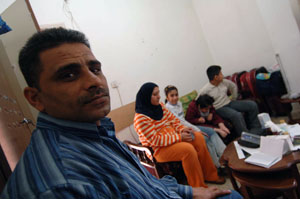
Adnan and his family are just some of the many Iraqis to have fled the conflict
Credits: Caritas David Snyder
By: David Snyder
On a hilly section of south Beirut, just off a side street littered with broken concrete, Adnan Saady and his family live out the quiet tragedy of the war in Iraq. Anxious to tell his story to anyone who will listen, Adnan sorts though the medical paperwork that has defined his family’s life since his youngest daughter was left critically injured by an explosion in 2003 – an injury that left her permanently disabled.
“The medical report says the girl had an accident that caused a brain injury, and because of that she has epileptic seizures,” Adnan said, looking over just one of the various forms that lie scattered on a small wooden table. “We didn’t have any hereditary conditions of epilepsy in our family.”
For Adnan and his family, who fled Iraq in late January 2007, the affects of the war in their homeland still haunt them. When a military weapons stockpile near their Baghdad home exploded in 2003, the wall of their home collapsed, killing Adnan’s father-in-law and critically wounding his youngest daughter Hanine, who was just 14 months old at the time. Left permanently disabled with head and foot injuries, Hanine was in need of specialized care – care that could not be provided amid the worsening security situation in Iraq.
“They referred us to a specialist for brain injuries, but we couldn’t get any regular care because of the war,” Adnan said. “We were afraid even to try to move to other areas because of bombs.”
Desperate for help for his daughter, Adnan spent most of the next three years approaching anyone who would listen to his story. The medical documents he carries, including one letter handwritten by a doctor in Baghdad, speak both of the desperation of his search, and the breakdown of a society no longer able to provide help even for those critically injured.
“I made a report to be resettled by humanitarian agencies so I could get treatment for my girl,” Adnan said. “But no one helped.”
Approaching the Red Crescent society in Iraq, Adnan was told that the care his daughter needed was simply not available in Iraq. Having exhausted all hope, he gathered his wife Huda and his three children and fled to neighboring Syria, then eventually to Lebanon. Now they, along with the vast majority of the estimated 40,000 Iraqi refugees in Lebanon, live illegally. Unable to return to Iraq, but with no money to find his way to a third country, Adnan says his dream is still to find someplace that can help his daughter.
“I will go to any country that can help my girl,” Adnan said. “But we don’t have any [means].”
After just a few days in Lebanon, Adnan and his family received some small measure of the assistance they sought. When a neighbor saw their child, he referred the family to Caritas Lebanon, which is working to assist 600 extremely vulnerable Iraqi refugees in Lebanon with a range of support. After approaching staff at the Caritas Migrants Center, Adnan says he was given help immediately.
“Caritas gave us blankets, and food, and diapers for my girl,” Adnan said. “They referred us to a specialist for care.”
In addition, Caritas also referred the family’s case to the United Nations High Commissioner for Refugees, responsible for resettling Iraqi’s in Lebanon to third countries. Because they are a special case, with unique needs, it is hoped the Saady family will be given resettlement priority.
Caritas is also providing some financial help to offset the costs of the medicines Hanine must take daily. At $90 each month, it is a sum far beyond the reach of Adnan, who has managed only 10 days of work as an illegal laborer. To save money, Adnan and his wife have been forced to give Hanine only half doses of her daily medications, and Adnan is struggling to pay the $100 a month rent on the small single room his family now calls home.
“This room is not healthy,” Saady said. “There are many bugs, and we don’t have hot water. This month, we didn’t pay because we don’t have the money.”
With so much to burden him, Adnan bears visibly the stress of his circumstances. His life now is paperwork, medications, and the hope that his daughter will finally receive the care she needs.
Looking over at Hanine, Adnan’s wife Huda offers a simple summary of the life their daughter now leads, adrift along with 2 million other refugees from the war in Iraq.
“She suffers,” Huda said quietly.
Find out more about the Caritas Lebanon Migration Centre
